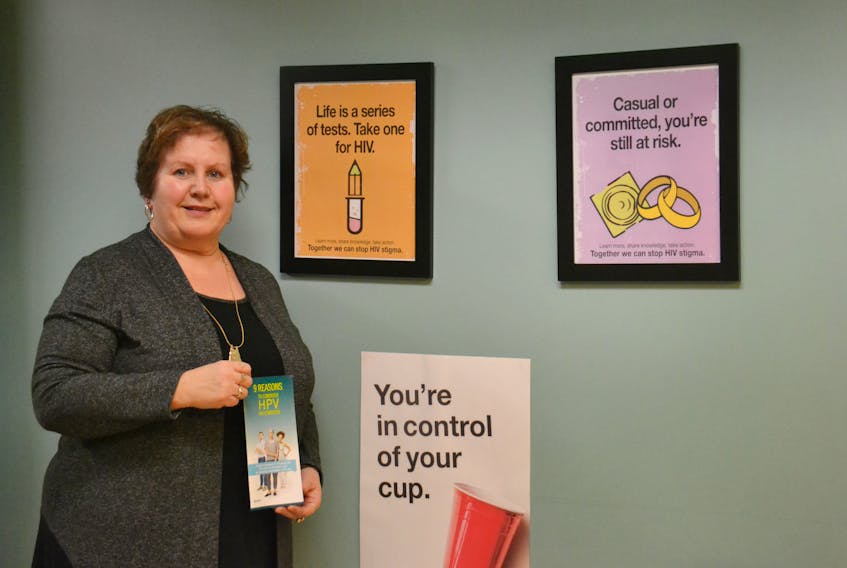CHARLOTTETOWN, P.E.I. - With a Canadawide resurgence of sexually transmitted infections like syphilis on the rise, P.E.I.’s chief public health officer says education and testing are key to keeping the illnesses from spreading further.
Dr. Heather Morrison said the most common sexually transmitted and blood-borne infection (STBBI) on P.E.I. is chlamydia. Those rates have been “creeping up” over the past 10 years, with an average of 240 cases of chlamydia per year.
Cases of syphilis, which have been increasing across Canada since 2000, hit six cases a year in P.E.I. between 2014-16. This was an illness that had previously been off the radar.
“It disappeared for a long time. I think it was probably always around, but it wasn’t here in the same way,” she told The Guardian in an interview.
“It’s a reminder that if you have unprotected sex, you can get chlamydia, gonorrhea, syphilis, herpes, HIV, HPV and hepatitis B (and C),” she said. “The infections can be transmitted by all forms of sexual conduct. So, oral sex, anal sex, sharing sex toys.”
She says it’s important for anyone who is sexually active to get tested regularly for STBBIs.
“If you are having multiple partners, you should get tested every three to six months. And every time you have a new partner, you should get tested.”
-Dr. Heather Morrison
“If you are having multiple partners, you should get tested every three to six months. And every time you have a new partner you should get tested,” she said. “Some sexually transmitted infections do not have any signs or symptoms, so you won’t know unless you get tested that you are infected.”
Testing is available at primary care offices and walk-in clinics. It is free with a health card, and treatment is covered for those who find the cost a barrier.
Morrison said for men and women under 21 years of age, testing for gonorrhea and chlamydia can be done via a urine sample, but for females over 21, a swab is required.
“For that young group, if they know they can do a urine specimen, that may encourage them to go,” she said, adding testing for syphilis, HIV and hepatitis B and C is done via a blood test.

All testing remains confidential, and if an infected person has multiple partners, Public Health will inform those partners they may have an infection and should get tested without revealing who the infected partner was.
The Health and Wellness Centre at UPEI also provides STBBI testing for students, faculty and staff.
Marilyn Barrett, director of the centre, said the on-campus clinic sees between five and six people per day coming in for screenings or with questions about sexual health, including those not yet sexually active who want to be proactive and are seeking information.
The centre has a registered nurse, a nurse practitioner and two part-time physicians available who are “constantly educating,” she said in a phone interview.
Along with available information, individual and group counselling is available and campus-wide campaigns are conducted twice per year, she said, noting the centre exercises a non-judgmental approach to sexual health.
“I am happy to report that I do see a real openness that I wouldn’t have expected or that I haven’t seen before, for people to come in and talk about these things.”
As for teaching the younger generation about sexual health, the province’s department of education said it starts at home.
“At this time, the family is the primary educator in the development of student attitudes and values,” the province said in an email to The Guardian Dec. 20.
It also said the province said students learn health-related information from many sources, “including home, school, peers, the community and the media,” and that the school’s health curriculum teaches “abstinences and other forms of contraceptives” and their effectiveness for preventing pregnancy and STBBIs.
The topic of STBBIs is introduced in the Grade 8 health curriculum and is further explored in the Grade 9 health curriculum.
At a glance
The topic of STBBIs is introduced in the Grade 8 health curriculum by:
- Demonstrating an understanding of responsibilities and consequences associated with being sexually active;
- Describing symptoms, effects, treatments and prevention for common sexually transmitted infection (STI);
- Describing basic types of contraceptives.
The Grade 9 health curriculum further explores safe sex practices in relation to STBBIs by:
- Determine “safe” sex practices;
- Developing strategies that address factors to prevent or reduce the risk of STIs and human immunodeficiency virus (HIV).
Over the past decade or so, the province has made strides in helping to prevent one particular STBBI — HPV.
According to Morrison, the vaccination to prevent HPV has been offered to Grade 6 girls since 2007 and to Grade 6 boys since 2013.
Not only does the vaccine help prevent genital warts, Morrison said it can reduce their chances of developing certain kinds of cancers, including cervical, oral, anal and throat.
“We’ve had very good uptake of our vaccines for girls and boys, almost 90 per cent of Grade 6 students, which is great.”
However, while vaccines are being administered in the schools, not all students participate in the sexual health part of the curriculum.
The email from the department of education said that while all students are required to take the health curriculum, within this health curriculum “there are specific outcomes in grades 6, 8 and 9 where opt-out is required if parents choose.” The department does not track the number of students who opt out, saying “it is a school-level process”.
When asked if there are students who go through the curriculum without learning about sexual health, the department said it had not received reports from schools indicating this as an issue.
At the moment, it is unclear what has caused an increase of STBBIs across the country and the province, but Morrison said the Chief Public Health Office will be doing more enhanced analysis this year to understand factors related to local transmission and looking at different factors involved in the spread.
“Then we can target our education a little bit better, so we can help prevent some more cases,” she said. “The rest of the country is also doing it, because the same trend is being seen right across the country.”
ONLINE









